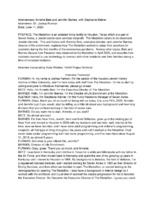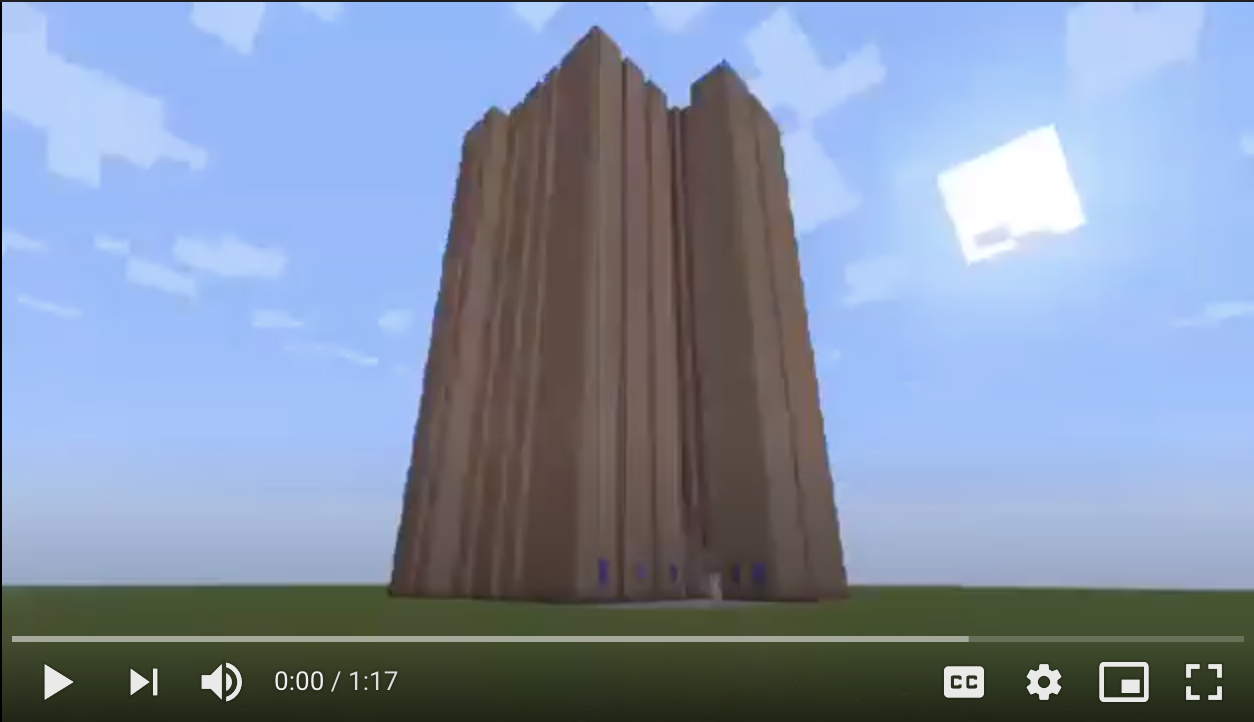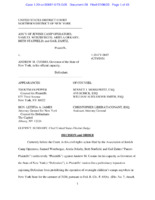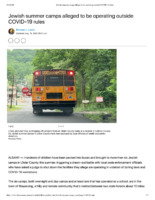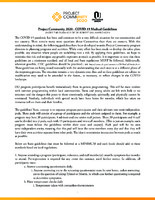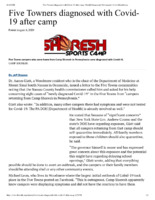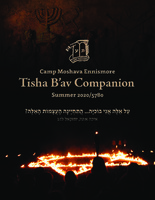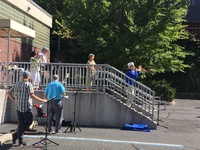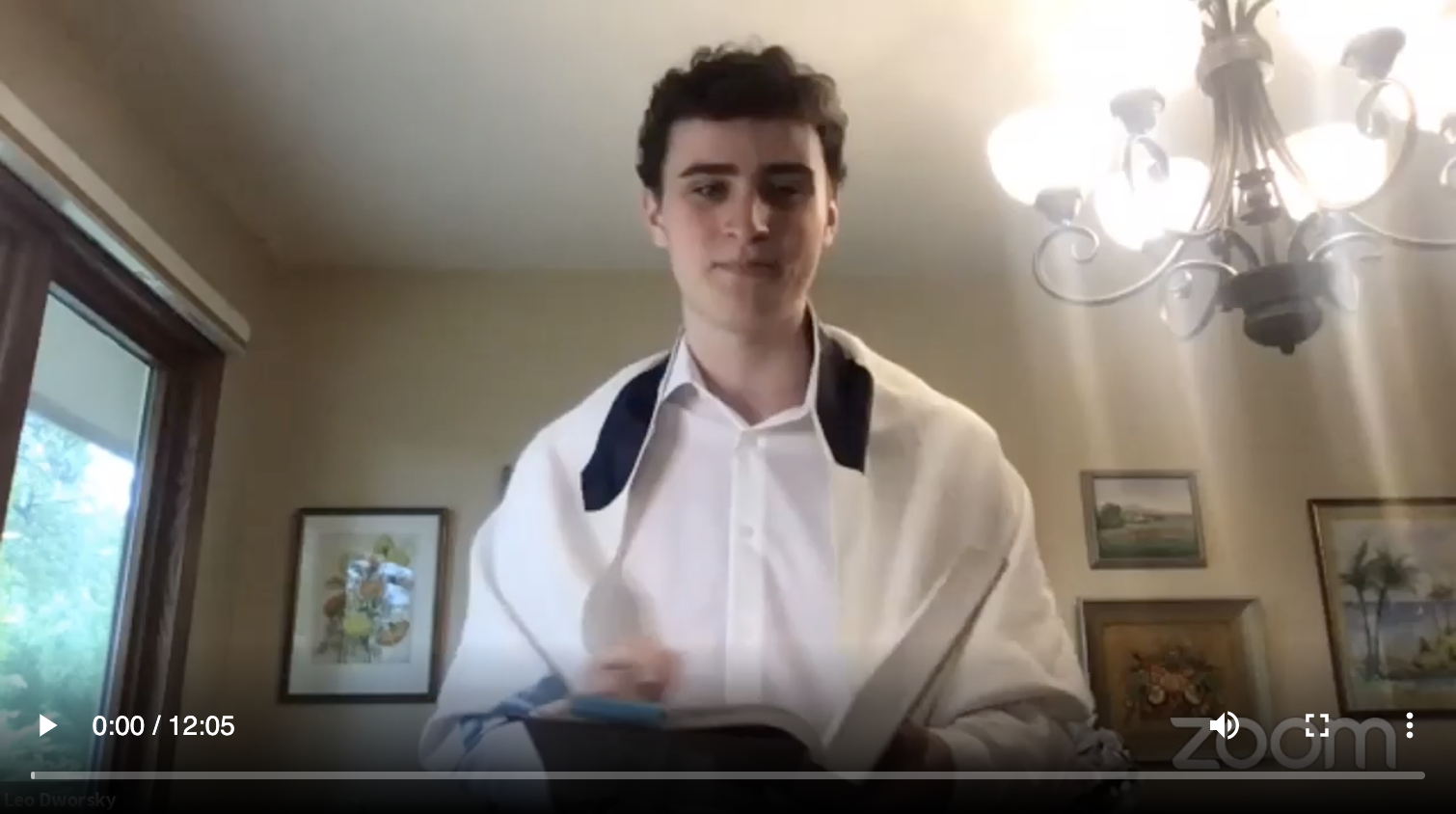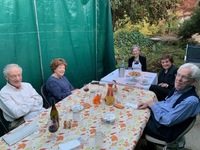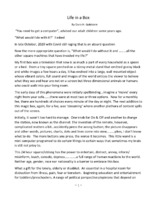American Jewish Life
Item set
- Title
-
American Jewish Life
Items
-
Entities Promoting Spiritual Remedies For Corona
These items provide examples of how Jewish businesses have created products aimed at health and wellness during the COVID-19 pandemic. -
Annette Betz, Jennifer Barnes (The Medallion) — Interview, Houston Jewish History Archive
In this discussion with the executive staff at a Houston senior care facility, they describe how they cared for residents in the first month of the pandemic, including how they observed Passover. -
Printed machzorim for rk and yk
I have machzorim printed from my shul. We davened at Tavern on the Green's outside patio. -
Minecraft Mania: Yeshiva University
Yeshiva University student Betzalel Shapiro recreated YU campus on Minecraft as part of an initiative launched by Hillel, a Jewish student organization, to help students handle isolation and idleness caused by COVID-19. -
JIMENA and COVID-19
These items show how JIMENA updated its offerings in light of the COVID-19 pandemic. -
Association of Jewish Camp Operators vs. Andrew M. Cuomo
In this decision from the United States District Court (Northern District of New York), the court denied the Association of Jewish Camp Operators' request for a preliminary injunction that would have allowed for the opening of Jewish overnight summer camps. The request was denied on the basis that opening overnight camps was not in the public interest of stopping the spread of COVID-19. The court also rejected the Plaintiffs' argument that the Defendants were not infringing on their First Amendment rights. -
Looking Forward to Summer 2021
This statement from Camp Dora Golding addresses the impact of COVID-19 on their summer 2020 camp season and looks forward to the 2021 season. -
Alleged Coronavirus Violations and Jewish Summer Camps
These articles discuss the potential role of Jewish summer camps in some COVID-19 outbreaks -
Project Community | Summer 2020 Updates
These items come from Project Community, a summer program developed by the Orthodox Union, details their response to COVID-19 and its impact on the summer camp season. -
Camp Shoshanim | Summer 2020 Updates
Shoshanim closed for the summer 2020 season and offered a virtual Shabbat. -
Camp Stone | Summer 2020
This collection of items shows how Camp Stone has conducted its summer 2020 camp season -
Shoresh Sports Camp
These items show how COVID-19 impacted the Shoresh Sports Camp and its community. -
Nageela West
These newsletters from Nageela West represent the way they've adapted some of their offerings due to the COVID-19 pandemic. -
Camp Moshava Ennismore | Summer 2020
This collection of items show how Camp Moshava adapted its summer 2020 season due to the COVID-19 pandemic by offering online experiences for campers. -
Joe Buchanan - Interview with the Houston Jewish History Archive at Rice University
In this interview from May 2020, Joe describes his Texas childhood, his journey to Judaism as an adult, and life as a performer during the coronavirus pandemic. He also performs four songs. In the final segment of the interview, he discusses what it’s like to not be able to perform for live audiences, and how he has adapted to offering religious services on Facebook and Zoom. -
Orthodox Union Kosher Food Lifeline
This collection of emails and webpages from OU Kosher Food Lifeline provide resources for members of the Jewish community looking to find kosher foods and products during the COVID-19 pandemic, especially during Pesach. -
Butterflake Bakery
These e-newsletters from Butterflake Bakery to their customers provide details about COVID-19 related changes, including online ordering, curbside pickup, and delivery. -
High Holidays 2020 at Congregation Beth Hatikvah, Summit, NJ
Two photos of the Sanctuary-turned-into-a TV Production Studio Two photos of our Shofar service in our parking lot (our only in-person experience) One photo of the Zoom experience of the Torah Service. The Torah Reader used a virtual laser pointer so the congregation could follow along as he was reading. One video of our teens playing Oseh Shalom with string instruments with our volunteer Singers joining in later in the number. One Word document with the description of our High Holiday planning. -
Sermon from Rabbi Olitzky - Ivri: Traditional Service - Rosh Hashanah Day 1
Rosh Hashanah Virtual Sermon -
Conservative Judaism in Northampton
Noah Barondes interrupted his October bar mitzvah ceremony to ask, to no one in particular, “Where are they going?” This ‘they’ would be the twenty some masked and socially distanced bar mitzvah attendees, caught in the act of an awkward, would-be surreptitious shuffle to the sunlight from the cold shaded tent they were originally sitting in. This disturbance in the ceremony, although relatively humorous, is just one of the many disruptions of Northampton’s Congregation B’nai Israel’s services induced by the pandemic. Unable to meet in person due to the risk of COVID-19 transmission, the synagogue has been forced to move its services online for streaming. This proved an immediate issue, as Conservative Jews practice Shabbat by not using electronic media (including taking pictures or being photographed, as streaming requires). This creates a whole host of restrictions most other religious groups did not have to consider when transitioning to an online service format. In addition to this, services at Congregation at B’nai Israel feature a strong focus on cooperative, communal prayer, and leading that prayer over the Internet is much more difficult than in-person. Normally, attendees would sing all together, creating lots of energy, but being on Zoom or a live-streamed service makes that kind of connection impossible. Services can feel inauthentic as religious experiences and more like chores, since many people are doing their jobs over Zoom, sitting in the same place in their home and at the same computer they work from. And that’s not even to mention the ways Zoom shortens people’s attention spans, making it far more difficult to sit down and concentrate on prayer. To adapt to these challenges created by the pandemic, Congregation B’nai Israel and its leaders have looked to the larger Jewish community and authority to guide their decisions on how to continue practicing their religion and reaching all members of their community at a time when they cannot be together. While it was unconventional and potentially against Jewish law to move services online, the United Synagogue of Conservative Judaism, the larger organization the Congregation is part of, was able to find solid rationale for bending those restrictions in order to keep people connected to their Jewish communities. For their part, Congregation B’nai Israel has made some adjustments to their services in order to make them more Zoom-friendly. For one thing, they have made services shorter, in order to combat that reduced attention span of service attendees. Their Shabbat morning services have shifted to become more focused on conversation and study of different texts, with a few prayers in the beginning and end of the service. The attendees seem to really enjoy this, but it’s unclear whether the new format will continue once the pandemic is over. Congregation B’nai Israel also monitors and responds to the pandemic with their personal COVID-19 task force, which includes a few infectious disease experts as well as the synagogue president. They work together to come up with recommendations on what will be safe for the community to do as far as in-person gathering, and whatever they say is carried out. At the moment, they have considered it safe to provide a few, heavily limited opportunities for in-person worship, one of which was Noah Barondes’s bar mitzvah. These gatherings are restricted to a specific size, and social distancing measures and masks are enforced at all times. In addition to these structural adaptations to the pandemic, Rabbi Justin David adapted the contents of his service too. He infused Barondes’s bar mitzvah with themes of hope and resilience, referencing the various tragedies of humanity in the Hebrew Bible and reminding the congregants that nevertheless, humanity persevered. This communal acknowledgement of suffering combined with the assurance that the community will survive is a reminder that religion is more than its rituals and practice: it’s a source of collective, spiritual strength in times of adversity. In a way, CBI’s services themselves act as a natural adaptation to the pandemic by providing a response to coronavirus anxieties. -
Thanksgiving in the Sukkah
This photo was taken on Thanksgiving day 2020. Due to the mild weather in Atlanta, local members of the Jewish community rebuilt their sukkah in order to safely have Thanksgiving outside. -
Essay, "Life in a Box" by Doris H. Goldstein
Essay written by Doris H. Goldstein of Atlanta, Georgia. A copy is housed in her papers in the Ida Pearle and Joseph Cuba Archives for Southern Jewish History at the William Breman Jewish Heritage Museum in Atlanta, Georgia (Mss 275, Martin and Doris Goldstein Papers, Box 1, File 5) -
Weekly Messages from Rabbi Bruce Aft
These blog posts from Rabbi Bruce Aft detail his response to the COVID-19 pandemic prior to his retirement in the summer of 2020. -
Prizmah Knowledge Center Resources on Finances Amidst the COVID-19 Pandemic
Prizmah is the network for Jewish day schools across North America. This is a collection of Prizmah's Knowledge Center resources that address general finances, financial aid, and budgeting during the COVID-19 pandemic. -
Prizmah Knowledge Center Resources on Mental Health & Emotional Support
Prizmah is the network for Jewish day schools across North America. This is a collection of Prizmah's Knowledge Center resources that address mental health and emotional support for families and their children.

